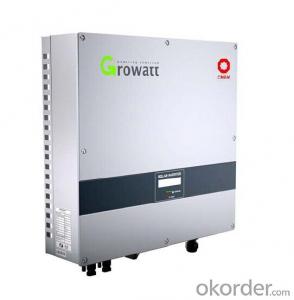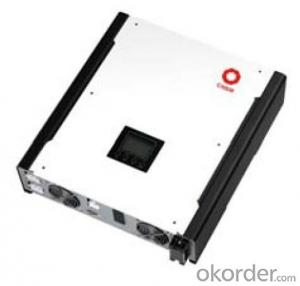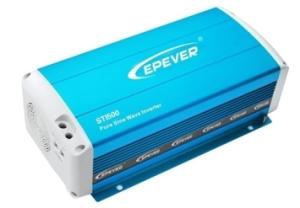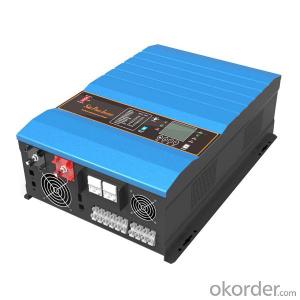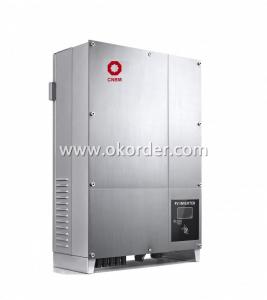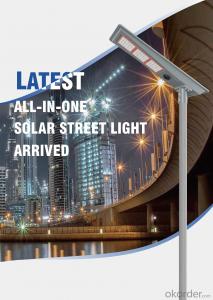2KW On-grid Inverter with Energy Storage 1KW/2kW/3kW hybrid inverter
- Loading Port:
- China main port
- Payment Terms:
- TT OR LC
- Min Order Qty:
- 1000 watt
- Supply Capability:
- 100000 watt/month
OKorder Service Pledge
OKorder Financial Service
You Might Also Like
Introduction
On-grid Inverter with Energy Storage 2kW/3kW hybrid inverter
Pure sine wave output
Microprocessor controlled to guarantee stable charging system
Multiple operations: Grid tie, Off grid, and grid tie with backup
Built-in MPPT solar charger
LCD display panel for comprehensive information
Multiple communication
Green substitution for generators
User adjustable charging current up to 25A
Features
Feed-in is not only choice
In comparison with conventional grid-tie inverter, CNBM-H is able to not only feed-in power to
grid but also store solar power to battery for future usage and directly power to the loads.
Save money by discharging battery for self-consumption first
CNBM-H can save money by using battery energy first when PV energy is low. Until battery
energy is low, CNBM will extract AC power from the grid.
Power backup when AC failed
CNBM-H can operate as an off-grid inverter to provide continuous power even without the grid.
It’s perfect power solution for remote regions or temporary AC power source such as camping or flea market.
Images
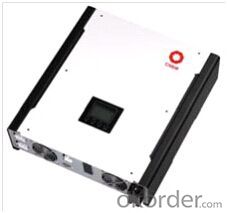

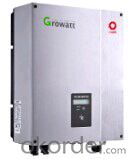

Sepecification
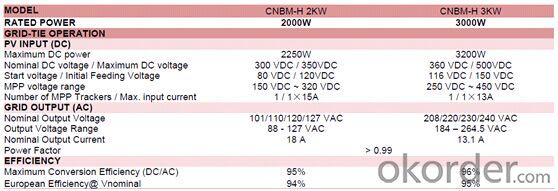
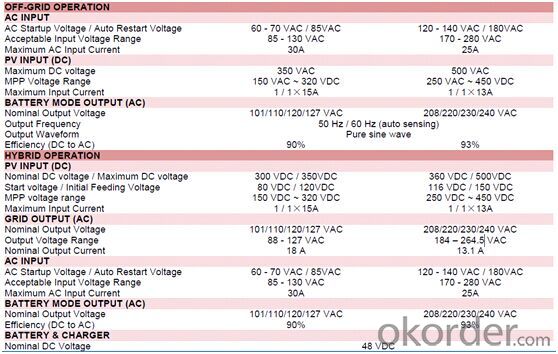
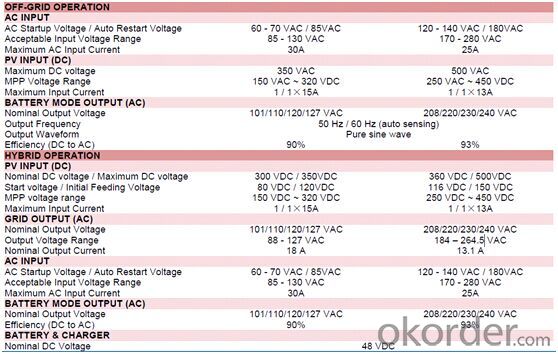
FAQ
Q1: How to choose a right inverter?
A1:Tell us your demand, then our sales will recommend a suitable inverter to you.
Q2: What's the different between inverter and solar inverter?
A2: Inverter is only accept AC input, but solar inverter not only accept AC input but also can connect with solar panel to accept PV input, it more save power.
Q3: How about the delivery time?
A3: 7 days for sample; 25 days for bulk order.
Q4: What is the warranty of inverter?
A4: 5/10 years warranty on CNBM-Solar product.
Q5: How to solve the technical problem?
A5: 24 hours after-service consultancy just for you and to make your problem to solve easily.
- Q:Can a solar inverter be used with solar-powered recreational vehicles (RVs)?
- Yes, a solar inverter can be used with solar-powered recreational vehicles (RVs). Solar inverters convert the direct current (DC) generated by the solar panels into alternating current (AC) that can be used to power various appliances and devices in the RV. This allows RV owners to utilize solar energy for their electrical needs while on the road.
- Q:What is the role of a reactive power controller in a solar inverter?
- The role of a reactive power controller in a solar inverter is to regulate and maintain the flow of reactive power to ensure a balanced and stable electrical grid. By dynamically controlling the reactive power output, the controller helps to improve power factor, minimize voltage fluctuations, and enhance the overall system performance and efficiency of the solar inverter.
- Q:Can a solar inverter be used in countries with different electrical standards?
- Yes, a solar inverter can be used in countries with different electrical standards by ensuring it is compatible with the specific electrical standards of the country. This may involve adjusting the voltage, frequency, and plug type to match the local requirements, or using voltage converters or adapters if necessary. It is important to consult with a professional or check the manufacturer's specifications to ensure proper compatibility and safe operation.
- Q:Can a solar inverter be used with a solar-powered waste management system?
- Yes, a solar inverter can be used with a solar-powered waste management system. A solar inverter is responsible for converting the direct current (DC) electricity produced by solar panels into alternating current (AC) electricity that can be used by electrical appliances and systems. In the case of a solar-powered waste management system, the solar inverter would convert the DC electricity generated by the solar panels into AC electricity, which can then power the various components of the waste management system such as motors, sensors, and controls. This ensures that the waste management system operates efficiently and effectively using renewable solar energy.
- Q:Can a solar inverter be used with different AC voltage systems?
- Yes, a solar inverter can be used with different AC voltage systems as long as it is compatible with the specific voltage range and frequency of the AC system.
- Q:What are the key considerations for selecting a reliable solar inverter manufacturer?
- When selecting a reliable solar inverter manufacturer, there are several key considerations to keep in mind. Firstly, it is important to assess the manufacturer's reputation and track record in the industry. Look for manufacturers with a solid history of producing high-quality and durable inverters. Secondly, evaluate the manufacturer's warranty and after-sales support. A reliable manufacturer should offer a comprehensive warranty that covers both the product and its performance. Additionally, they should have a responsive customer support team that can assist with any inquiries or issues that may arise. Thirdly, consider the efficiency and performance of the inverters offered by the manufacturer. Look for inverters that have high conversion efficiency, which can maximize the solar energy generation and optimize the system's overall performance. Furthermore, it is crucial to assess the manufacturer's compliance with industry standards and certifications. Look for manufacturers that adhere to recognized quality standards and have certifications such as ISO 9001 and IEC 62109. Lastly, consider the manufacturer's financial stability and longevity. A reliable manufacturer should have a strong financial standing and be well-established in the market. This ensures their ability to honor warranties and provide ongoing support. By considering these key factors, you can select a reliable solar inverter manufacturer that offers high-quality products, excellent customer support, and a strong reputation in the industry.
- Q:Can a solar inverter be connected to a smartphone app for monitoring?
- Yes, a solar inverter can be connected to a smartphone app for monitoring. Many solar inverter manufacturers offer mobile apps that allow users to monitor and control their solar power systems remotely through their smartphones. These apps provide real-time data on energy production, system performance, and can also enable users to adjust settings and receive alerts or notifications related to their solar power system.
- Q:How does a solar inverter handle voltage fluctuations from the solar panels?
- A solar inverter handles voltage fluctuations from the solar panels by employing a technique called Maximum Power Point Tracking (MPPT). The MPPT algorithm continuously monitors the voltage and current output of the solar panels and adjusts the operating point to ensure maximum power transfer. This allows the inverter to adapt to varying sunlight intensity and temperature conditions, efficiently converting the DC power generated by the panels into standard AC power. The inverter also incorporates voltage regulation and protection mechanisms to ensure stable and safe operation despite any voltage fluctuations.
- Q:Can a solar inverter be used in areas with high levels of electrical noise or interference?
- Yes, a solar inverter can be used in areas with high levels of electrical noise or interference. However, it is important to ensure that the inverter is designed to handle such conditions and has appropriate noise filtering mechanisms in place to minimize any potential disruptions or damage caused by the interference.
- Q:How does the total harmonic distortion affect the performance of a solar inverter?
- Total harmonic distortion (THD) refers to the distortion in the waveform of an electrical signal caused by the presence of harmonics. In the case of a solar inverter, high levels of THD can negatively impact its performance. Excessive THD can lead to voltage and current waveform distortions, which can result in various issues such as reduced power quality, increased losses, and decreased efficiency of the solar inverter. These distortions can also affect the overall performance and lifespan of connected electrical devices, potentially leading to their malfunction or premature failure. Therefore, it is crucial to ensure that a solar inverter maintains low levels of THD to optimize its performance and minimize any adverse effects on the connected electrical systems.
1. Manufacturer Overview |
|
|---|---|
| Location | |
| Year Established | |
| Annual Output Value | |
| Main Markets | |
| Company Certifications | |
2. Manufacturer Certificates |
|
|---|---|
| a) Certification Name | |
| Range | |
| Reference | |
| Validity Period | |
3. Manufacturer Capability |
|
|---|---|
| a)Trade Capacity | |
| Nearest Port | |
| Export Percentage | |
| No.of Employees in Trade Department | |
| Language Spoken: | |
| b)Factory Information | |
| Factory Size: | |
| No. of Production Lines | |
| Contract Manufacturing | |
| Product Price Range | |
Send your message to us
2KW On-grid Inverter with Energy Storage 1KW/2kW/3kW hybrid inverter
- Loading Port:
- China main port
- Payment Terms:
- TT OR LC
- Min Order Qty:
- 1000 watt
- Supply Capability:
- 100000 watt/month
OKorder Service Pledge
OKorder Financial Service
Similar products
New products
Hot products
Hot Searches
Related keywords
